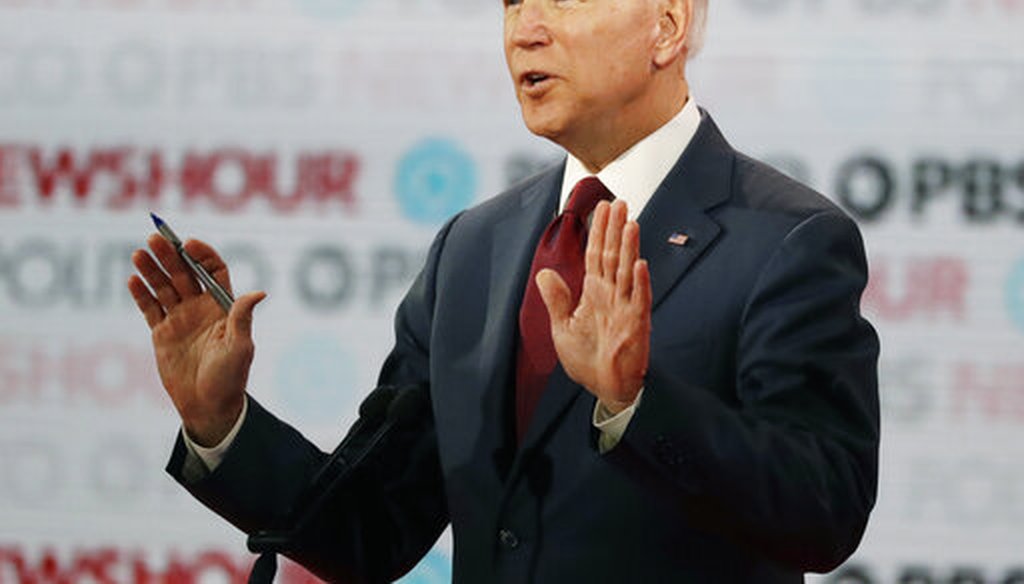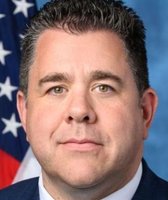Stand up for the facts!
Our only agenda is to publish the truth so you can be an informed participant in democracy.
We need your help.
I would like to contribute

Democratic presidential candidate former Vice President Joe Biden speaks during a Democratic presidential primary debate Thursday, Dec. 19, 2019, in Los Angeles. (AP)
Congress put roadblocks in front of efforts to close Gitmo, as Biden said.
Former Vice President Joe Biden is usually first to bring up the record of the Obama administration in his 2020 presidential campaign. But at the Democratic debate in Los Angeles, Biden had to defend an area where the administration failed.
Obama left office without closing the Guantanamo Bay detention facility.
The facility remains open under President Donald Trump, housing about 40 detainees at an annual cost of about $540 million.
Biden said that the Obama administration tried to close Guantanamo. But it was missing one thing.
"You have to have congressional authority to do it," Biden answered Dec. 19.
Sign up for PolitiFact texts
One way Obama wanted to close the facility was by moving detainees to U.S. facilities, which Congress blocked through legislation. Some have argued that Obama did have other options to close Guantanamo, but they were unpopular even within his own party, and it’s not at all clear they would have been successful. We’ll recap the history.
On Jan. 22, 2009, Obama issued an executive order calling for Guantanamo’s closure within one year. That year was Obama’s best chance to close Gitmo since he held large majorities in the House and Senate.
But Obama angered lawmakers after he transferred a detainee to New York, announced a plan to bring the terrorists responsible for 9/11 to the United States, and planned to purchase a facility in Illinois for detainees.
Obama’s moves led Congress to repeatedly bar the use of funds to house Guantanamo detainees in the United States.
Obama officials discussed the possibility of using executive authority to close the detention camp, but ultimately ruled that out.
Obama was forced to "choose between two politically unsavory options: Invoke executive power to relocate the remaining detainees in defiance of a statute, or allow history to say he never fulfilled his promise to shutter the prison," wrote New York Times reporter Charlie Savage in November 2015.
Obama’s Office of Legal Counsel never bought the argument that these the congressional restrictions were unconstitutional, said Avril Haines, a legal adviser for the National Security Council during the Obama administration. (She was part of efforts to try to close Gitmo but not within the Office of Legal Counsel.)
Legal experts were divided about whether the restrictions Congress imposed were constitutional.
While some during the Obama administration argued that the congressional ban on transfers prevented Guantanamo from closing, Gregory B. Craig, White House counsel in 2009, and Cliff Sloan, special envoy for Guantanamo closure in 2013 and 2014, wrote a Washington Post op-ed in November 2015 arguing that Obama did have authority to close the facility.
"Under Article II of the Constitution, the president has exclusive authority to determine the facilities in which military detainees are held," they wrote. "Obama has the authority to move forward. He should use it."
Their op-ed set off a debate among legal scholars and political experts.
Obama did decide on one approach for removing Gitmo prisoners: transferring them to other countries. But he ran out of time.
During the final days of his administration, Obama announced the four final transfers to other countries bringing the total number of international transfers from Guantanamo under Obama to about 200.
On Jan. 19, 2017, Obama wrote a letter to Congress stating that the restrictions "make no sense" given the lack of escapes at supermax and military prisons.
The next day Trump was sworn into office. He has kept his promise to keep Guantanamo open.
Cully Stimson, former deputy assistant secretary of defense for detainee affairs during President George W. Bush’s administration, said it was the Obama White House that soured relations with Congress from the beginning.
"Instead of working behind the scenes with members of the president’s own party to forge an acceptable closure plan, the administration took unilateral action, which in turn soured its relationship with Congress," Stimson wrote.
The Obama administration also could have been more aggressive about transferring prisoners to other countries. "Biden ignores the fact that you can close Guantanamo without bringing them to the U.S. and violating a congressional statute," Stimson said. "It’s always been an option and preferred option to send detainees to their home countries and third party countries. Any administration including this one could do that today. It’s difficult, it presents challenges, but it is possible."
Asked why the Obama administration didn’t close Guantanamo, Biden said, "You have to have congressional authority to do it."
Congress made it hard for Obama to fulfill his promise, blocking Obama from transferring detainees to U.S. prisons. Obama was allowed to transfer detainees to other countries, and did transfer many of them. But he ran out of time at the end of his presidency, keeping the prison open with 41 detainees.
Some legal experts said Obama had the legal right to close Guantanamo but lacked the political willpower. Others questioned if he truly had that power. Ultimately the Obama administration didn’t take that tack, so we’ll never know. Certainly what Congress did made the task much harder.
We rate this statement Mostly True.
Our Sources
Lawfare, President Obama's NDAA Signing Statement on Guantanamo, Nov. 30, 2015
Politico, Obama slams Congress for blocking efforts to close Gitmo, Jan. 19, 2017
Politico, Obama's incredibly shrinking chance to close Gitmo, Feb. 22, 2016
Human Rights First, NDAA Provisions Undermine President’s Ability to Close Guantanamo, May 13, 2016
New York Times, The Cost of Running Guantánamo Bay: $13 Million Per Prisoner, Sept. 16, 2019
NPR, Trump Inherits Guantanamo's Remaining Detainees, Jan. 19, 2017
Washington Post op-ed by Gregory B Craig and Cliff Sloan, The president doesn’t need Congress’s permission to close Guantanamo, Nov. 6, 2015
LawFare, The Great Guantanamo Showdown, Nov. 9, 2015
Washington Post editorial, Obama cannot go it alone on Guantanamo, Nov. 20, 2015
Just Security, [UPDATED] GTMO at the End of the Obama Administration: 31 uncharged detainees remain, Jan. 19, 2017
Georgetown University Law Center professor Marty Lederman in Just Security, The insoluble Guantánamo problem (Part Three: Executive disregard of the GTMO-to-U.S. relocation prohibition is not a solution) Nov. 13, 2015
New York Times, Guantánamo Is Leaving Obama With Choices, Neither of Them Simple, Nov. 1, 2015
Heritage Foundation’s Charles "Cully" Stimson, Closing Guantanamo: A Legal and Policy Analysis of the Senate Provision, Sept. 28, 2015
Cardozo law professor Deborah Pearlstein, Constitutionality of Congressional Restrictions on Guantanamo Prisoner Transfers, Oct. 27, 2015
Congressional Research Service, Closing the Guantanamo Detention Center: Legal Issues, May 30, 2013
NBC, Will Obama Use Executive Order to Close Guantanamo Bay? Feb. 23, 2016
Northwestern University law review Christopher M. Ford, War by legislation: the constitutionality of congressional regulation of detentions in armed conflicts, 2016
PolitiFact, No, Gitmo detainees not headed to ‘neighborhood near you’ as Florida congressman said, July 19, 2019
PolitiFact’s Trump-O-Meter, Keep Guantanamo Bay Detention Center open, Jan. 31, 2018
PolitiFact’s Obameter, Close the Guantanamo Bay Detention Center, Jan. 20, 2017
Telephone interview, Charles "Cully" Stimson, Heritage Foundation senior legal fellow and former Deputy Assistant Secretary of Defense for Detainee Affairs, Dec. 19, 2019
Email interview, Andrew Bates, Joe Biden campaign spokesman, Dec. 19, 2019
Email interview, Deborah Pearlstein, Cardozo professor of constitutional and international law, Dec. 20, 2019
Email interview, Daphne Eviatar, director, Security with Human Rights, Amnesty International USA, Dec. 20, 2019
Telephone interview, Avril Haines, deputy director of Columbia World Projects, a lecturer in law at Columbia Law School, and a senior fellow at the Johns Hopkins University Applied Physics Laboratory, Dec. 19, 2019
Browse the Truth-O-Meter
More by Amy Sherman
Congress put roadblocks in front of efforts to close Gitmo, as Biden said.
Support independent fact-checking.
Become a member!
In a world of wild talk and fake news, help us stand up for the facts.













































